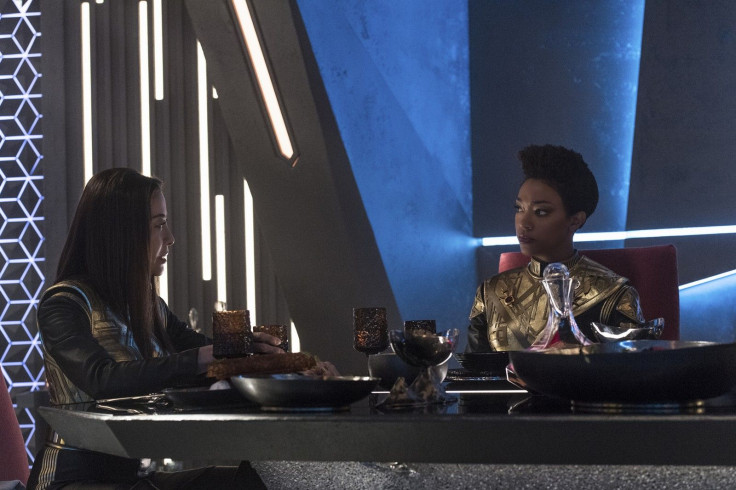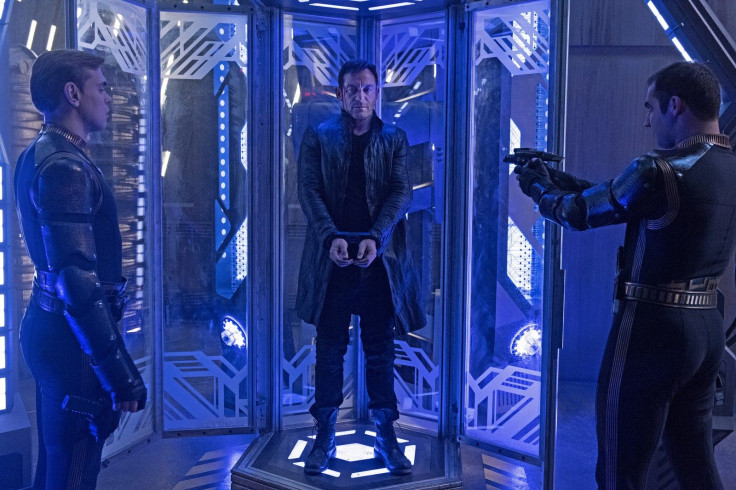“Vaulting Ambition” is the third episode of Star Trek: Discovery set in the fascistic Mirror Universe, where the galaxy is ruled by the Terran Empire and its Emperor, revealed to be Philippa Georgiou (Michelle Yeoh) at the end of “The Wolf Inside.” Michael Burnham (Sonequa Martin-Green) has already confronted Mirror Universe versions of people killed in the Klingon war back in her universe, specters from her past, but Georgiou is the woman she most profoundly betrayed.
Burnham’s audience with the Emperor is just one of three ongoing plotlines Discovery juggles in “Vaulting Ambition.” Stamets is trapped in the mycelial network (the muscle and nerve tissue between all points in space and time) with his Mirror Universe counterpart. Meanwhile, Saru (Doug Jones) works to convince the Klingon prisoner L’Rell (Mary Chieffo) she’s the only one who can ease the suffering of the Ash/Voq hybrid (Shazad Latif) exposed in”The Wolf Inside.” As Burnham enters the lion’s den, Saru and Stamets deal with the aftermath of the past few episodes. In part, “Vaulting Ambition” feels like an episode paying overdue bills, the very beginning of the end for Discovery’s first season.
But we’re not there quite yet. First, Michael Burnham has to sit down to dinner with Emperor Georgiou. Just like previous Mirror Universe episodes, “Vaulting Ambition” proves expert at twisting Star Trek values through stomach-churning glimpses of how easily utopia can flop into dystopia. We’ve seen brigs replaced with agonizer booths and transporters used for executions. In “Vaulting Ambition” Burnham feasts on Saru (or a Kelpien that looked just like him), forced to swallow when the Emperor shoves the raw threat ganglia into her mouth. And even that was for nothing, because Emperor Georgiou is already convinced Burnham (her adopted daughter in this universe) conspired with Lorca (Jason Isaacs) against her. All of their subterfuge is undermined by backstabbing political maneuvers that happened before their arrival.

Which leads to an inevitable choice. Burnham explains the whole situation to Emperor Georgiou, essentially throwing herself on the mercy of the court. Maybe it had to come to this reckoning. And maybe it’s a fitting dramatic turn as well, with Burnham forced to trust this dark version of the mentor she overruled back in the Prime Universe. But after all the maneuvering, after all the careful play-acting to maintain their deception in the Mirror Universe, “Vaulting Ambition” feels a little deflating. By episode’s end it looks like Emperor Georgiou might just help the Discovery crew get back to their original universe, since it’s to her advantage to keep United Federation of Planets philosophies from infecting her totalitarian culture, but there’s still something jolting in this forced compromise with evil.
If this reckoning between Burnham and Georgiou feels a little short-changed, it’s soon obvious why. “Vaulting Ambition” is saving itself for a big twist: Captain Lorca was never the Federation’s Captain Lorca. He was from the Mirror Universe all along! The reveal is a little too clever for its own good, as Burnham flashes back to conversations shared over the course of the season, recontextualizing them as sociopathically manipulative.
As twists go, Mirror Lorca is more surprising but less satisfying than the slow unmasking of Ash Tyler. Whereas Tyler’s internal conflict crackles with dramatic possibilities, Lorca being evil flattens the character; a twist that reduces, rather than enhances, thematic ambiguity. It’s no longer the case that Lorca is a vulnerable human, whose wartime compromises draw him closer and closer to a viciousness incompatible with Starfleet. Nope, he’s just evil.
One thematic constant in Star Trek: Discovery has been the consequences of following or bending the rules. In “Context is for Kings” Lorca argues explicitly for an elitist mindset where destiny’s chosen, or the merely smart and ambitious, deserve to contextualize their decisions apart from societal scrutiny. It was a profoundly anti-Star Trek position, but occasionally seemed almost sensible, such as when strict adherence to Star Trek environmental code made the Discovery vulnerable to Harry Mudd in “Magic to Make the Sanest Man Go Mad.”
But just as often bending the rules lead to ruin, like when Burnham covered for Tyler and his psychotic breaks, or when Dr. Culber allowed himself to be convinced Stamets could handle more spore drive jumps. The season seemed to endorse a middle ground position: characters should follow their principles, but not drift too far from the moral universe they inhabit, because each subsequent choice takes you further and further afield. In this formulation, Lorca would be a cautionary tale. A man who believed he was pursuing good ends, but found himself adrift and unable to make the right decisions anymore. Now that’s out the window. Instead, good people got duped by an evil guy from a parallel universe.
That could change. Lorca’s true nature is the cliffhanger ending, so it’s not yet clear what role he’ll play in the rest of the season. It’s even possible his failed coup against the Emperor was done for noble reasons, just like Mirror Spock’s successful takeover of the Terran Empire a decade or two after the events of Discovery. Good twists are written to put characters in new and interesting positions, bad twists are written to surprise the audience. It’s unclear where Mirror Universe Lorca sits. There’s still time for Lorca’s true nature to have interesting consequences for Star Trek: Discovery, though it’s hard to see them from inside “Vaulting Ambition.”
Compared to Burnham and Lorca’s decisions aboard the Emperor’s flagship, the troubles on Discovery feel trivial. Moved to compassion by Tyler’s suffering, L’Rell does something to his mind, maybe even closing off his Klingon side. The consequences of L’Rell’s choices won’t be clear until the next episode. As for Stamets, he frees himself from the mycelial network, but it seems to be too late for Discovery’s spore drive. They’ll have to find another way to get back home.
Star Trek: Discovery returns next Sunday for “What’s Past is Prologue.”
- Richly redesigned Klingons
- Complex and explicable motives
- Great new Starfleet characters
- Incredible production design
- Generic space combat and action
- Too many flashbacks
- Eschews subtext, doesn't put enough faith in the audience



















